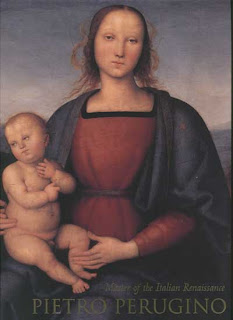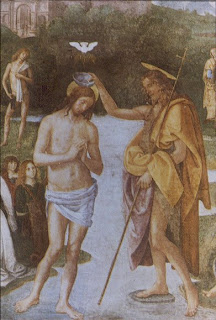
A message from Mother Angelica can be found here
A message from Father Corapi can be found here
Please keep them and all our priests and religious in your daily prayers.










Pietro Perugino (1446–1524) was the leading painter of the Umbrian school, who developed some of the qualities that found classic expression in the High Renaissance.Source Wikipedia
He was born Pietro Vannucci in Città della Pieve, Umbria, the son of Cristoforo Vannucci; his nickname characterizes him as from Perugia, the chief city of Umbria.
Pietro painted at Arezzo, thence moved to Florence. The date of this first Florentine sojourn is by no means settled; some make it as early as 1470, others push the date to 1479. According to Vasari, he apprenticed in the atelier of Andrea del Verrocchio alongside Leonardo da Vinci. He may have learned perspective from Piero della Francesca. In 1472 he must have completed his apprenticeship, for he was enrolled as a painter in the confraternity of St Luke.
Perugino was one of the earliest Italian practitioners of oil painting. Some of his early works were extensive frescoes for the convent of the Ingesati fathers, destroyed during the siege of Florence, 1537; he produced for them also many cartoons, which they executed with brilliant effect in stained glass. A good specimen of his early style in tempera is the tondo (circular picture) in the Musée du Louvre of the Virgin and Child Enthroned between Saints.
The Christian moral system is no minor part of Christianity, any more than the heart or lungs are minor parts of the human body. Overthrow the Christian moral system and you will have overthrown Christianity itself. Therefore, those who are pushing for the institution of same-sex marriage are ipso facto pushing for the elimination of the Christian religion... Prof. David R. CarlinHow Homosexual “Marriage” Threatens Our Nation and Faith—TFP Urges Lawful and Conscientious Resistance

FIVE NON-NEGOTIABLES
These five current issues concern actions that are intrinsically evil and must never be promoted by the law. Intrinsically evil actions are those that fundamentally conflict with the moral law and can never be deliberately performed under any circumstances. It is a serious sin to deliberately endorse or promote any of these actions, and no candidate who really wants to advance the common good will support any action contrary to the non-negotiable principles involved in these issues.
1. Abortion
The Church teaches that, regarding a law permitting abortions, it is "never licit to obey it, or to take part in a propaganda campaign in favor of such a law, or to vote for it" (EV 73). Abortion is the intentional and direct killing of an innocent human being, and therefore it is a form of homicide.
The unborn child is always an innocent party, and no law may permit the taking of his life. Even when a child is conceived through rape or incest, the fault is not the child’s, who should not suffer death for others’ sins.
2. Euthanasia
Often disguised by the name "mercy killing," euthanasia is also a form of homicide. No person has a right to take his own life, and no one has the right to take the life of any innocent person.
In euthanasia, the ill or elderly are killed, by action or omission, out of a misplaced sense of compassion, but true compassion cannot include intentionally doing something intrinsically evil to another person (cf. EV 73).
3. Embryonic Stem Cell Research
Human embryos are human beings. "Respect for the dignity of the human being excludes all experimental manipulation or exploitation of the human embryo" (CRF 4b).
Recent scientific advances show that often medical treatments that researchers hope to develop from experimentation on embryonic stem cells can be developed by using adult stem cells instead. Adult stem cells can be obtained without doing harm to the adults from whom they come. Thus there is no valid medical argument in favor of using embryonic stem cells. And even if there were benefits to be had from such experiments, they would not justify destroying innocent embryonic humans.
4. Human Cloning
"Attempts . . . for obtaining a human being without any connection with sexuality through ‘twin fission,’ cloning, or parthenogenesis are to be considered contrary to the moral law, since they are in opposition to the dignity both of human procreation and of the conjugal union" (RHL I:6).
Human cloning also involves abortion because the "rejected" or "unsuccessful" embryonic clones are destroyed, yet each clone is a human being.
5. Homosexual "Marriage"
True marriage is the union of one man and one woman. Legal recognition of any other union as "marriage" undermines true marriage, and legal recognition of homosexual unions actually does homosexual persons a disfavor by encouraging them to persist in what is an objectively immoral arrangement.
"When legislation in favor of the recognition of homosexual unions is proposed for the first time in a legislative assembly, the Catholic lawmaker has a moral duty to express his opposition clearly and publicly and to vote against it. To vote in favor of a law so harmful to the common good is gravely immoral" (UHP 10).